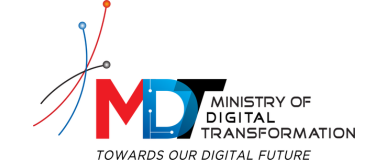About the Client
Trinidad and Tobago – The Ministry of Digital Transformation (MDT)
Established in July 2021, MDT spearheads Trinidad and Tobago’s Digital Agenda, aiming to fostering a ‘Digital Nation’ where citizens and businesses alike have equitable access to quality ICTs, fostering improved quality of life and economic development. Guided by three pillars: Digital Society, Digital Economy, and Digital Government, MDT’s digital journey amalgamates past insights with current ICT opportunities, aiming to accelerate progress by making Moko Jumbie strides. and embody the spirit of the Moko Jumbie.
Challenges
In alignment with national policy directives, the government is fully committed to advancing e-government initiatives, emphasizing the imperative of digitizing all business processes and services, while also transitioning public records and documents into digital realms. In line with this vision, the Ministry of Digital Transformation is proactively positioning itself as a model for this digital transformation, undertaking an introspective examination to identify areas ripe for enhancement.
At present, the Ministry of Digital Transformation acknowledges the prevalence of manual processes and the reliance on physical records within its operations. Recognizing this as a prime opportunity for improvement, the ministry is dedicated to enhancing efficiency and transparency by transitioning these processes into digital formats. This strategic move not only aligns with broader government objectives but also reinforces the ministry’s commitment to driving transformative change and fostering a culture of innovation.

From left to Right: Dorian Dyer II – Information and Communications Technology (ICT) Director, MDT, Georgia Garbo-Noel – Manager, Knowledge Management, MDT, Cory Belfon – Permanent Secretary (Ag.), MDT, Tatsiana Lahuta Kuru – Project Manager, NRD Companies, Glaisha Roberts – Project Manager, MDT, Bronislovas Balvočius – Team Lead, NRD Companies.
Solution
To proceed with transitioning MDT internal processes into digital formats, a thorough examination of the existing situation is essential, along with onboarding different best practices, from such fields as business analysis, enterprise architecture, change management and others. For this exercise the MDT has partnered with NRD Companies’ consultancy team.
The project implemented aimed to identify key high-value processes for improvement, analyze and redesign workflows to minimize manual tasks, and strive for a paperless environment. Objectives included waste reduction, according to lead and six sigma methodologies, and establishing standards for continuous improvement.
NRD Companies Provided Services
To achieve the set objectives, NRD Companies in tight cooperation with the MDT team, has provided comprehensive support by employing BPM paradigms and tailoring solutions which to best meet MDT needs. Particularly logic of the intervention included the following:
- Process Identification. The initial stage involved identifying and prioritizing processes for further discovery and analysis. This step included extensive information-gathering activities, resulting in a catalog of prioritized MDT business processes.
- Process discovery. Employing traditional process analysis approaches, this stage documented the current state of processes and identified opportunities for improvement.
- Process analysis. Aligned with the BPM lifecycle, this stage delved deeply into processes to identify bottlenecks, inefficiencies, and areas for improvement.
- Process Improvement. During this stage, solutions for identified inefficiencies were formulated and documented. Adjustments were mapped to illustrate how processes could be carried out more efficiently, highlighting which business process components needed change.
- Road mapping. This phase transitioned proposed solutions from development to production, identifying high-level timelines, plans, risks, and change management aspects.
- Functional and Technical requirements. Utilizing the TOGAF paradigm of Building Blocks, this phase defined potentially reusable packages of functionality to meet specific business needs.

From Right to left: Nerissa Blackman – Senior Human Resource Officer III (Ag.), MDT, Cory Belfon – Permanent Secretary (Ag.), MDT.
Results
NRD Companies’ collaboration with the Ministry of Digital Transformation resulted in a robust readiness of MDT’s operational environment for further digitalization and automation. This partnership has paved the way for MDT to fully onboard the benefits of these advancements, including boosting process efficiencies, increasing transparency, enhancing internal communication, and improving monitoring and reporting mechanisms.

Replicability
While the consultancy services provided are tailored to the specific context of Trinidad and Tobago, the methodologies and frameworks developed can serve as a template for other countries embarking on similar digital transformation journeys. The principles of lean and six sigma, along with the systematic reengineering of processes, are applicable across various contexts.
SDGs Addressed

SDG 9: Industry, Innovation, and Infrastructure
The project fosters innovation and builds resilient infrastructure by digitizing government processes, thus supporting sustainable economic growth and enhancing technological capabilities.
SDG 11: Sustainable Cities and Communities
Improving accessibility and efficiency of government services through digital means contributes to creating more sustainable and livable communities.
SDG 17: Partnerships for the Goals
The digital transformation enhances transparency, accountability, and inclusivity, thereby strengthening institutions and fostering trust between the government and citizens.











